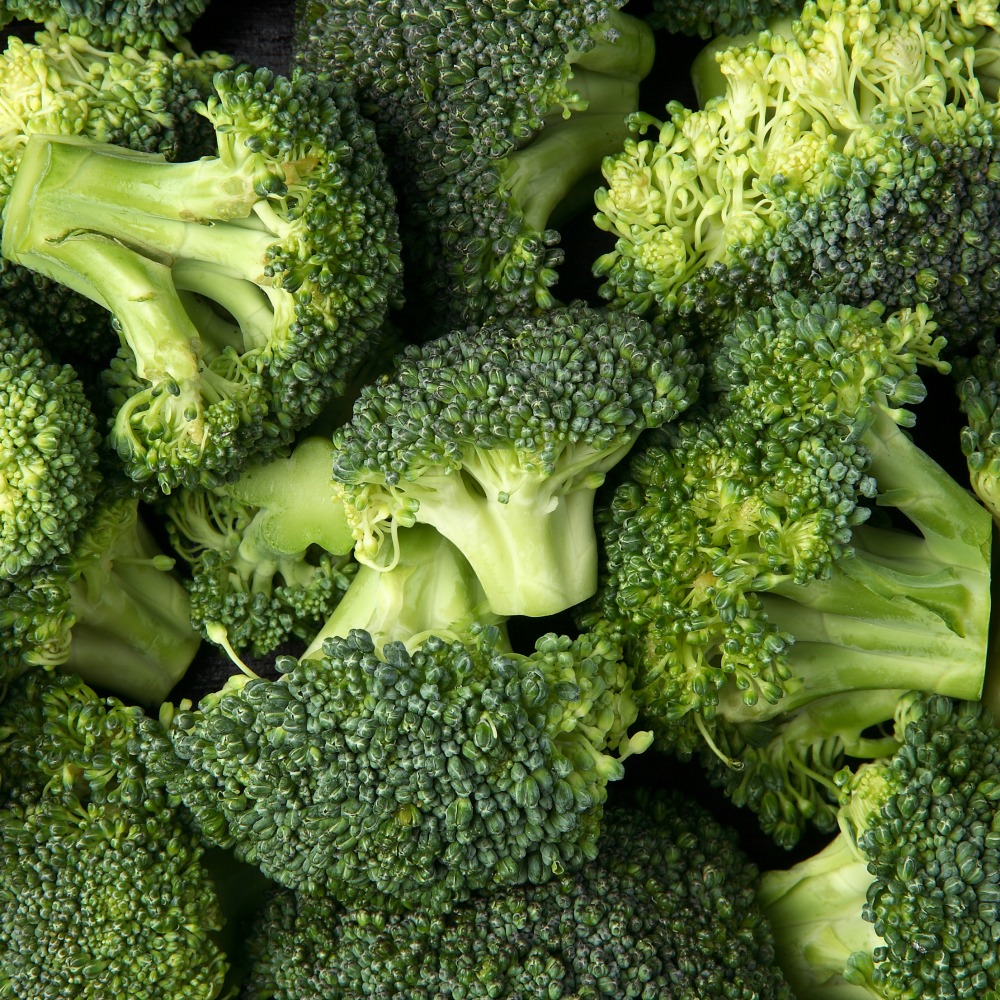One cup of raw broccoli (91 grams) contains 6 grams of carbs, 2.6 grams of protein, 0.3 grams of fat, 2.4 grams of fiber, 135% of the Recommended Daily intake of vitamin C, 11% of the RDI of vitamin A, 116% of the RDI of vitamin K, 14% of the RDI of folate, 8% of the RDI for potassium, 6% of the RDI for phosphorus and 3% of the RDI for selenium, making a pretty impressive nutrient profile.
The benefits of broccoli are carried out through copious amounts of fiber, sulforaphane, glucoraphanin, phenolic compounds, DIM, beta carotene, lutein, zeaxanthin, folate, vitamins C/E/K, and minerals. Broccoli, like most cruciferous veggies, contains glucosinolates that help to promote health and fight disease which also may explain why some of these vegetables have a pungent aroma and slightly bitter flavor.
One of the most powerful cancer-fighting ingredients that can be found within broccoli is sulforaphane which helps to support proper DNA replication and function of the cells. It encourages cell death in oral, colon, bladder, prostate, lungs, brain, breasts, tongue, thyroid, pharynx, esophageal, and skin cancers; sulforaphane is effective against most cancers.
3 servings a week of Brussels sprouts, cabbage, broccoli, or other cruciferous veggies may reduce the overall risk of cancer by over 60%. Sulforaphane also helps to reduce damage from free radicals by as much as 73% which can cause harm to various body systems and cells. It induces cancer cell death without harming healthy cells, strengthens healthy cell production, and enhances the ability of certain anticancer/chemotherapy medications while limiting their toxic effects on normal cells. Sulforaphane also has powerful anti-inflammatory compounds that support brain function, fight diabetes, heart disease, and allergies among others.
Phenolic compounds found within broccoli help to stop damage from free radicals and reduce inflammation that are the beginnings of many serious diseases; these compounds are also effective against viral, fungal, and bacterial infections.
DIM/Diindolylmethane compounds within broccoli have many beneficial effects on the body including boosting the immune system and making it more effective at killing cancer cells; it is a metabolite of indole 3 carbinol, and it helps to prevent excess estrogen from converting into a dangerous form of estrogen. A study published in Pharmaceutical Research found low doses of DIM to induce a protein that helps to kill cancer and reduce new cancer cell growth. Another study published in Pharmaceutical Research found low doses of DIM to induce the production of a protein in prostate cancer cells that weakens and kills cancer cells and stops their spread.
Broccoli sprouts are an alternative broccoli that is even more potent, 2-day old sprouts can contain up to 50 times the levels of cancer-preventing compounds as mature broccoli; these sprouts can be grown at home and enjoyed raw, and their mild taste makes them compatible with a variety of salads, sandwiches, smoothies, and to be used as a garnish. Baby broccoli/broccolini is even milder to taste; its tender crisp texture makes it great for steaming which boosts the sulforaphane and other photochemical content.
Combining mustard seed, daikon radish, wasabi, arugula, or cabbage with broccoli can help to maximize the potential cancer-fighting effects of broccoli. The American Institute for Cancer Research suggests those who consumed a broccoli supplement and a second food with myrosinase had higher levels of sulforaphane in their blood and urine.
Broccoli has a bounty of benefits that extend beyond cancer prevention making consuming this cruciferous vegetable well worth it. Broccoli also helps to fight non-alcoholic fatty liver disease and liver cancer by lowering triglyceride levels; detoxifying the body; reducing inflammation; protecting skin from sun damage; improving digestion by adding fiber for a healthy gut and supporting a healthy microbiome; reducing/maintaining blood sugar levels; supporting heart health; containing flavonoids that fight allergies; and its carotenoids support eye health.
It looks like your parents were right to make you sit at the table until you ate all of your broccoli. Adding grass-fed butter or cheese to it can help those who don’t like the taste to eat it, and the healthy fats will also help to improve the absorption of many nutrients found within it.




